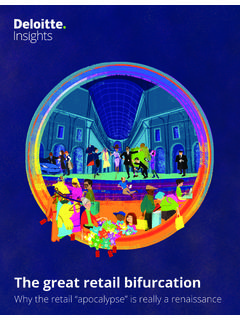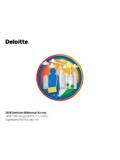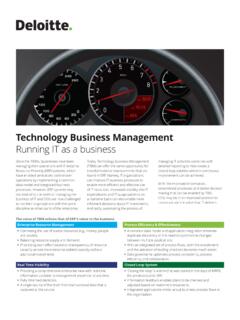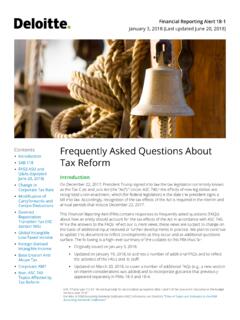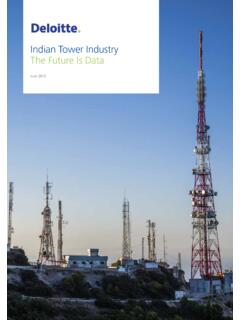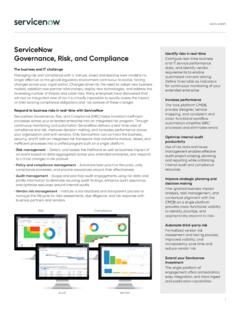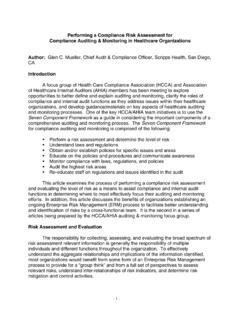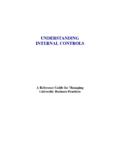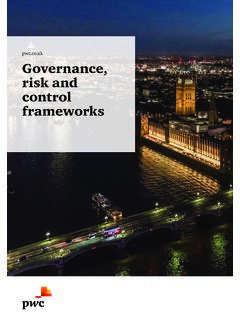Transcription of The changing role of internal audit - Deloitte
1 June changing role of internal audit2 The current scenario All organisations are subject to fraud risks and there have been several instances in the past couple of decades when frauds have led to the downfall of organisations as a whole. Some notable examples include, Enron and Worldcom in the USA and Satyam near home. The current economic slowdown has brought to surface a number of high profile frauds like the Reebok and Citibank cases thereby increasing the focus on fraud risk management. Global regulations like the US Foreign Corrupt Practices Act (FCPA), UK Bribery Act, Sarbanes Oxley Act have increasingly put responsibility on the management of organisations to implement an effective fraud risk management framework.
2 In the wake of increasing incidents of frauds in the financial service sector, the Reserve Bank of India (RBI) introduced guidelines for comprehensive Fraud Risk Management (FRM) system for banks. With increased regulatory focus and widespread negative impact of frauds, the managements and senior executives are increasingly concerned about the vulnerability and exposure of their businesses/organisations to frauds and whether or not they are adequately protected. A recent survey undertaken by Deloitte for fraud in Indian banks indicated that more than half the frauds were detected by internal audit reviews.
3 This brings into focus the role of internal audit in fraud risk the mandate and role of internal audit continue to evolve, managements are increasingly counting on internal audit functions in their efforts for managing fraud risks and keeping organisations protected. Increasingly, the internal audit function is not to monitor and detect but also to investigate fraud incidences when they arise. The role of internal audit in fraud risk management by way of preventing, detecting and investigating fraud has amplified as a result of economic uncertainty and increased focus of certain organisation's management on fraud risks .
4 internal audit - the traditional role According to Chartered Institute of internal Auditors, the role of internal audit is to provide independent assurance that an organisation s risk management, governance and internal control processes are operating effectively. Unlike external auditors, they look beyond financial risks and statements to consider wider issues such as the organisation s reputation, growth, its impact on the environment and the way it treats its employees. The below chart provides the fundamental functions of an internal audit team.
5 The changing role of internal audit The ever increasing regulations and expansion of organisations across the globe into new markets exposed the organisations to greater regulatory and compliance risks . Regulators expect thorough due diligence, oversight Fraud Detection mechanismAnonymous complaint by external partyInternal audit /legal/complianceWhistleblower mechanismBy accidentFraud detection/analytics solution OthersNot disclosed43%53%37%20%20%17%40%Source: India Banking Fraud Survey 2012 Assurance Assessment and Recommen-dations Oversight Advisory ServicesObjective examination to provide accurate and current information to the stakeholders about the efficiency and effectiveness of its policies and operations, and the status of its compliance with the statutory obligationsAssessing and making recommendations on the effectiveness of the existing controls Demonstrates informed, accountable decision making with regard to ethics, compliance , risk.
6 Economy and efficiencyAssessing and making recommendations on the effectiveness of the existing controls Demonstrates informed, accountable decision making with regard to ethics, compliance , risk, economy and efficiencyAssessing and making recommendations on the effectiveness of the existing controls Demonstrates informed, accountable decision making with regard to ethics, compliance , risk, economy and efficiencyThe changing role of internal audit 3and background checks to be performed on partners, vendors, suppliers and others.
7 As fraud has a number of negative impacts on organisations financial and reputational it is important for the organisations to have a strong fraud prevention programme. As organisations work towards reducing the losses due to fraud, their anti-fraud programmes are increasingly looking towards the internal audit function for support in light of the fact that over time as internal auditors review systems in the organisation, they develop an overall knowledge of the organisation s processes, risks , control systems and personnel which can contribute to an effective fraud risk IIA provides mandatory guidance for internal auditors in its International Professionals Practices Framework (IPPF).
8 internal auditors are expected to have sufficient knowledge to evaluate the risk of fraud in their organisations, and are required to report to the board any fraud risks found during their investigations. IPPF also expects the internal audit activity to evaluate the potential for the occurrence of fraud and how the organisation manages its fraud risk. The expectation is that internal auditing should provide objective assurance to the board and management that fraud controls are sufficient for identified fraud risks and ensure that the controls are functioning effectively.
9 internal auditors may review the comprehensiveness and adequacy of the risks identified by management especially with regard to management override how can this work in practice? While planning their annual audit plan, internal auditors should consider the assessment of fraud risk and review management s fraud management capabilities periodically. They should regularly and closely communicate with those responsible for risk assessments in the organisation and also others in key roles throughout the organisation, to ensure timely fraud risk management.
10 internal auditors, during their assignments, should spend an adequate time and attention to evaluating the framework and internal controls related to fraud risk management. It is also imperative to have a well-defined response plan to handle potential frauds uncovered during an internal audit up with the new role Though the role and responsibility of internal audit function may vary in scope and authority in different organizations, there is a clear trend that internal audit is taking on a more strategic and central role.
